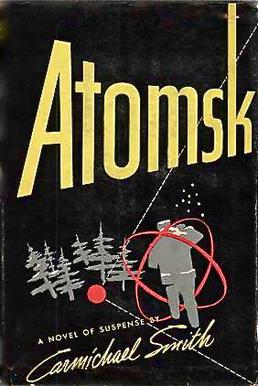
Paul Myron Anthony Linebarger, better known by his pen-name Cordwainer Smith, was an American author known for his science fiction works. Linebarger was a US Army officer, a noted East Asia scholar, and an expert in psychological warfare. Although his career as a writer was shortened by his death at the age of 53, he is considered one of science fiction's more influential and talented authors.
Espionage, spying, or intelligence gathering is the act of obtaining secret or confidential information (intelligence). A person who commits espionage is called an espionage agent or spy. Any individual or spy ring, in the service of a government, company, criminal organization, or independent operation, can commit espionage. The practice is clandestine, as it is by definition unwelcome. In some circumstances, it may be a legal tool of law enforcement and in others, it may be illegal and punishable by law.
Spy fiction is a genre of literature involving espionage as an important context or plot device. It emerged in the early twentieth century, inspired by rivalries and intrigues between the major powers, and the establishment of modern intelligence agencies. It was given new impetus by the development of fascism and communism in the lead-up to World War II, continued to develop during the Cold War, and received a fresh impetus from the emergence of rogue states, international criminal organizations, global terrorist networks, maritime piracy and technological sabotage and espionage as potent threats to Western societies. As a genre, spy fiction is thematically related to the novel of adventure, the thriller and the politico-military thriller.
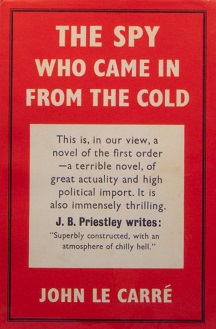
The Spy Who Came in from the Cold is a 1963 Cold War spy novel by the British author John le Carré. It depicts Alec Leamas, a British agent, being sent to East Germany as a faux defector to sow disinformation about a powerful East German intelligence officer. It serves as a sequel to le Carré's previous novels Call for the Dead and A Murder of Quality, which also featured the fictitious British intelligence organization, "The Circus", and its agents George Smiley and Peter Guillam.
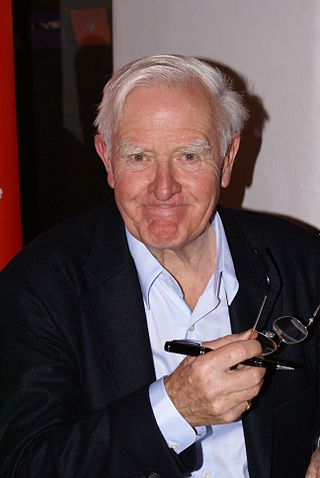
David John Moore Cornwell, better known by his pen name John le Carré, was a British and Irish author, best known for his espionage novels, many of which were successfully adapted for film or television. "A sophisticated, morally ambiguous writer", he is considered one of the greatest novelists of the postwar era. During the 1950s and 1960s he worked for both the Security Service (MI5) and the Secret Intelligence Service (MI6).
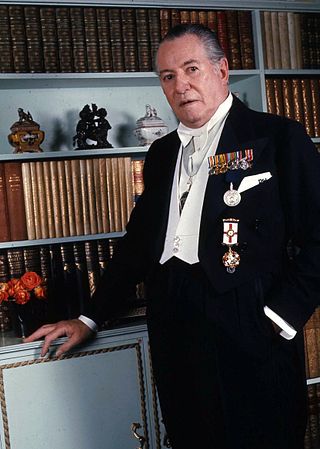
Dennis Yeats Wheatley was a British writer whose prolific output of thrillers and occult novels made him one of the world's best-selling authors from the 1930s through the 1960s. His Gregory Sallust series was one of the main inspirations for Ian Fleming's James Bond stories.
A sleeper agent, also called sleeper cell, is a spy who is placed in a target country or organization not to undertake an immediate mission but to act as a potential asset if activated. Even if unactivated, the "sleeper agent" is still an asset and can still play an active role in sedition, espionage or possibly treason by virtue of agreeing to act if activated. Sleeper agents may also work in groups of a clandestine cell system with other agents.

Helen Clark MacInnes was a Scottish-American writer of espionage novels.

The Rediscovery of Man: The Complete Short Science Fiction of Cordwainer Smith (ISBN 0-915368-56-0) is a 1993 book containing the complete collected short fiction of American science fiction author Cordwainer Smith. It was edited by James A. Mann and published by NESFA Press.

"Mother Hitton's Littul Kittons" is a classic science fiction short story by American writer Cordwainer Smith, first published in Galaxy Magazine in 1961, and partly based on Ali Baba and the Forty Thieves. It is collected most recently in The Rediscovery of Man. It details the methods by which the Norstrilians of Smith's fictional "Instrumentality" universe maintain their monopoly on the precious immortality drug stroon. The story details part of the background to the novel Norstrilia.

Norstrilia is a science fiction novel by American writer Paul Linebarger, published under the pseudonym Cordwainer Smith. It is the only novel he published under this name, which he used for his science fiction works. It takes place in Smith's Instrumentality of Mankind universe, and was heavily influenced by the classic Chinese novel Journey to the West. The novel is in part a sequel to Smith's 1962 short story "The Ballad of Lost C'Mell", featuring some of the same characters and settings.
Jove Books, formerly known as Pyramid Books, is an American paperback and eBook publishing imprint, founded as an independent paperback house in 1949 by Almat Magazine Publishers. The company was sold to the Walter Reade Organization in the late 1960s. It was acquired in 1974 by Harcourt Brace which renamed it to Jove in 1977 and continued the line as an imprint. In 1979, they sold it to The Putnam Berkley Group, which is now part of the Penguin Group.
The Cold War was reflected in culture through music, movies, books, television, and other media, as well as sports, social beliefs, and behavior. Major elements of the Cold War included the threat of communist expansion, a nuclear war, and – connected to both – espionage. Many works use the Cold War as a backdrop or directly take part in a fictional conflict between the United States and the Soviet Union. The period 1953–62 saw Cold War themes becoming mainstream as a public preoccupation. For the historical context in the US, see United States in the 1950s.
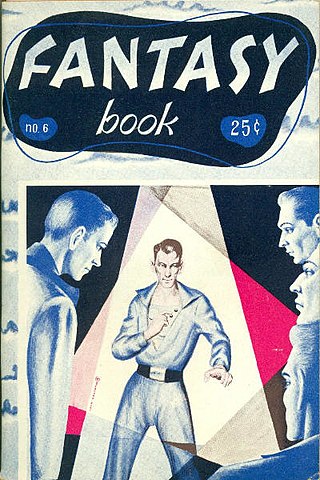
"Scanners Live in Vain" is a science fiction short story by American writer Cordwainer Smith. It was the first story in Smith's Instrumentality of Mankind future history to be published and the first story to appear under the Smith pseudonym. It first appeared in the semi-professional magazine Fantasy Book.

Glasshouse is a science fiction novel by British author Charles Stross, first published in 2006. The novel is set in the twenty-seventh century aboard a spacecraft adrift in interstellar space. Robin, the protagonist, has recently had his memory erased. He agrees to take part in an experiment, during which he is placed inside a model of a late twentieth/early twenty-first century Euroamerican society. Robin is given a new identity and body, specifically that of a woman named "Reeve". Major themes of this novel are identity, gender determinism, self-image and conformity. Contrary to popular belief, it is not a sequel to his 2005 novel Accelerando, although Stross has stated that the two novels are not obviously incompatible. Glasshouse won the Prometheus Award for 2007, and was nominated for the Hugo, Campbell, and Locus Awards in 2007.

"Alpha Ralpha Boulevard" is a science fiction story by American writer Cordwainer Smith, set in his Instrumentality of Mankind universe, concerning the opening days of a sudden radical shift from a controlling, benevolent, but sterile society, to one with individuality, danger and excitement. The story has been reprinted a number of times, including in The Best of Cordwainer Smith and The Rediscovery of Man collections.

Kirk Allen was the pseudonym given to a patient of Robert M. Lindner's, in his book The Fifty-Minute Hour. Born in Hawaii, "Allen" soon became obsessed with a series of novels, the protagonist of which shared his name. Due to "Allen"'s anonymity, it is unclear what the series was, apart from the fact that it was science fiction. Some have theorized that the series was the Barsoom books, by Edgar Rice Burroughs, featuring the main character John Carter.
Alan Emlyn Williams was an ex-foreign correspondent, novelist and writer of thrillers.

Fantasy Book was a semi-professional American science fiction magazine that published eight issues between 1947 and 1951. The editor was William Crawford, and the publisher was Crawford's Fantasy Publishing Company, Inc. Crawford had problems distributing the magazine, and his budget limited the quality of the paper he could afford and the artwork he was able to buy, but he attracted submissions from some well-known writers, including Isaac Asimov, Frederik Pohl, A. E. van Vogt, Robert Bloch, and L. Ron Hubbard. The best-known story to appear in the magazine was Cordwainer Smith's first sale, "Scanners Live in Vain", which was later included in the first Science Fiction Hall of Fame anthology, and is now regarded as one of Smith's finest works. Jack Gaughan, later an award-winning science fiction artist, made his first professional sale to Fantasy Book, for the cover illustrating Smith's story.

The Best of Cordwainer Smith is a collection of science fiction short stories by American author Cordwainer Smith, edited by J. J. Pierce. It was first published in hardback by Nelson Doubleday in July 1975 and in paperback by Ballantine Books in September of the same year as a volume in its Classic Library of Science Fiction. The Ballantine edition was reprinted in October 1977 and July 1985. Phoenix Pick issued a new edition in trade paperback and ebook in April, 2017. A British paperback edition under the alternative title The Rediscovery of Man was published by Gollancz in June 1988, and reissued in 1999, 2003, and 2010; Gollancz also brought out hardcover and ebook versions in September 1988 and November 2012, respectively. The book has also been translated into German.
